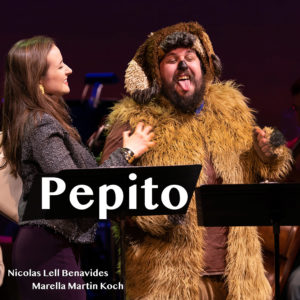
CD Review: Nick Benavides and Marella Martin Koch’s ‘Pepito’
A 20-Minute Opera Full of Nuance & Emotional Pull
By Chris RuelThe recording of “Pepito,” a comedic opera in one act with music by Nicolas Lell Benavides and libretto by Marella Martin Koch, is set to release on May 1, 2020 and it is an amusing, quick-hit of delightful opera worth a listen.
This compact, 20-minute chamber opera tells the story of Pepito, a shelter dog meeting a husband and wife who come in looking for a puppy but leave with the older hound.
The opera opens with Pepito remembering his old family. Camila, a disappointed lawyer, arrives at the shelter before her clueless commodities trader husband David enters apologizing for his tardiness. Soon, a strong bond between Camila and Pepito develops, but David is more reticent about adopting an older dog, reminding Camila that they came to the shelter seeking a puppy.
However, according to Angie, an earnest shelter volunteer, informs the couple they cannot view the puppies since she is about to close shop for the day, and the pups are too overstimulated for visitors. As Camila and David tussle over whether Pepito is the right dog for them, we see cracks in their marriage emerge, adding meaningful depth to the short production.
Singers, Score, and Libretto Shine
Nicolas Lell Benavides’s score, prepared for soprano, mezzo-soprano, tenor, and bass, along with a chamber orchestra, is light, fun, and full of playful moments. Sonorous, rich, with sweeping moments in the brass and string sections, bring a lush, open, and stirring touch. Benavides composed a memorable sonic experience that complements and augments Koch’s libretto. The score, though whimsical, is not frivolous.
The story is charming, never venturing into the realm of silliness. There are plenty of woofs, whimpers, and howls, but not to the point of being annoying. Koch has something to say, and though it’s communicated in a light-hearted manner, there’s meat to chew on and, for me, a large question arises at the opera’s conclusion: Will Pepito be Camila and David’s marital savior or a toppling domino leading to the couple’s separation?
Koch’s storytelling is lean and well-trimmed, the writer economizing her words without compromising her ability to world build and place the listener within the shelter and Pepito’s canine brain.
Benavides and Koch’s opera, commissioned by the Washington National Opera at the John F. Kennedy Center of the Performing Arts, was first produced at the Kennedy Center during the 2018 – 19 season. Benavides has the distinct honor of being the first-ever young artist composer in residence with the Glimmerglass Festival. Koch is no stranger to penning short operas, with this being her third. Previous operas have run times under 10 minutes. Her knack for fleshing out characters post haste is sharp.
Each singer shines, the quartet well-chosen for their roles.
Bass Samuel J. Weiser, a graduate of the WNO Cafritz Young Artists program, brings a broad and melodious timbre as he hangs around his middle and upper registers for much of the opera. His opening aria, “I can smell my old life,” is full of woofs, whimpers, and howling, the howls portamento and glissando lines push Weiser into his head voice and he sounds comfortable doing so. The aria ends with Pepito’s nose in the air, sniffing, and sensing both money and sadness in the air as Camila and David enter, arguing, setting up the question I mentioned earlier: Will Pepito be a uniter or divider?
Stirring Moments
David, sung by tenor Joshua Blue, opens with a duet of sung dialogue showcasing a luscious golden tone that pairs well with soprano Alexandra Nowakowski’s clear and crisp sound as they bicker in “I don’t know why you’re so upset.”
Mezzo-soprano, Alexandra Christoforakis enters the fray, informing the couple they have but 15 minutes to visit Pepito before she shutters the shelter for the day. Christoforakis has a rich dramatic quality perfect for singing the part of the over-zealous volunteer.
After a short recitative, “Can one always be sorry,” a beautiful duet, “You get four minutes alone with the dog,” unfolds between Camila and Pepito as David steps away to take a phone call. Camila hints at her less- than-stellar relationship with her husband. “There’s nothing to be gained from an imperfect match. Trust me, I know I have been wrong before.” I found, “You get four minutes,” to be one of the most moving set pieces in the opera with beautiful, swelling lines in the horn and strings.
Nowakowski shows off her strong upper range, reaching and holding a resounding g for nearly two measures before jumping to a strong, unwavering b a few measures later. She finishes the duet holding the same note, pianissimo. In a poignant moment, Camila reveals that she would like a child, asking Pepito if he could walk a youngster home from school. Pepito enters a soliloquy, reminiscing about how he used to escort a child named Diego in his old life. “Four minutes alone” is a highlight not to be missed.
Camila, a Spanish-speaker, learns that Pepito understands the language as he grows animated by her words. Angie returns, warning time is up as Camila explains that Pepito responds enthusiastically when she speaks Spanish. David enters, saying he, too, likes when Camila speaks the language because it reminds him of how hot she is (The librettist’s words, not mine.) David, not thrilled by Camila’s affection for Pepito. Pepito makes her feel something—her hurt is full of love, she feels alive, there is magic in the air.
She loves Pepito, and Pepito loves her, something missing in her marriage. The Camila/Pepito duettino at the end of “Dogs don’t speak Spanish, Camila” is full of emotion and music reminiscent of “Four minutes alone” in its sweeping scope and Nowakowski’s soaring voice. A charming nod to Mozart’s “Die Zauberflöte’s” “Pa-Pa-Pa-Pa-Pa-Pa-Papagena” appears at the end of with Camila intoning “¡Pe-pit-it-it-it-it-it-it-it-it-o!”
Are You Ready?
Mezzo Christoforakis has her moment as she reminds the couple that love is not all that a dog needs in her arietta declamata “His name is Pepito (Are you ready?)” Her plaintive shading adding emotional power to her gentle admonition that a lot of good people let dogs down.
A moving quartet in the traditional style ends the piece, the voices and chamber orchestra reaching the climax of the opera. Camila says she’s ready to adopt Pepito while Angie questions the couple’s readiness to adopt.
Joshua Blue’s arietta in “Ven acá” is touching. David sees the love Camila has for Pepito, wondering why she doesn’t express the same affection towards him. Blue opens up showing skill in the upper range with a luscious forte B—his highest note in the opera. The answer Camila provides to David’s question is not positive. She doesn’t want him, but, perhaps, Pepito can change all that. David attaches the leash to Pepito, hands it to Camila, and the couple leaves with their new pet. A touching moment, but will it last?
The recording quality is exemplary. There’s no mushiness to be heard—enabling the listener to capture Koch’s words sans libretto, even during interwoven lines of text.
Crystal clear diction from the singers and tight conducting by Benavides makes the album sparkle. Just as David and Camila give Pepito a chance, I encourage you to, as well.



